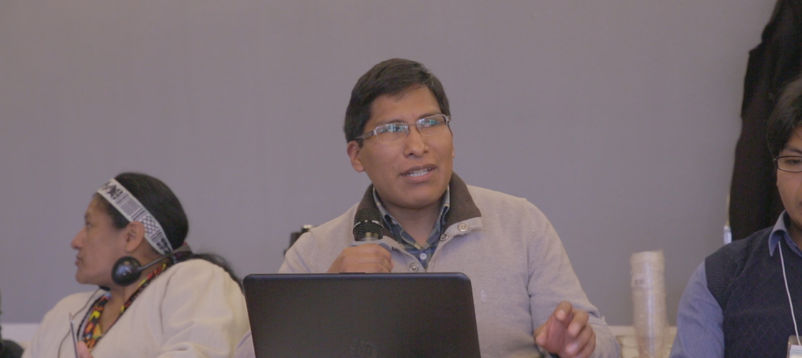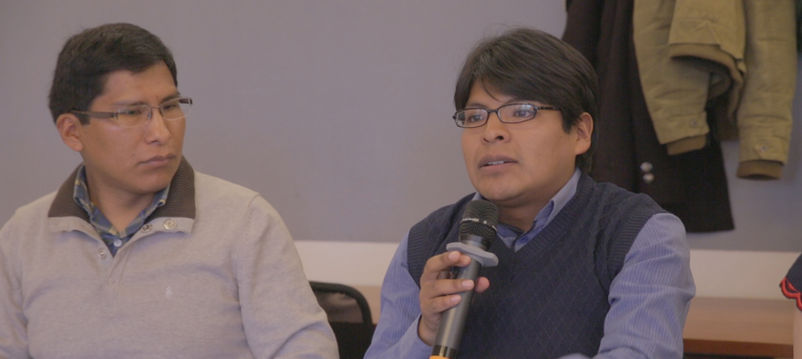Victoria Tauli-Corpuz
Victoria Tauli-Corpuz
Victoria Tauli-Corpuz
Victoria Tauli-Corpuz
Victoria Tauli-Corpuz is the UN Special Rapporteur on the Rights of Indigenous Peoples, a position she has held since 2014. An indigenous leader hailing from the Kankanaey Igorot community in the Philippines’ Cordillera region, she has been fighting for the rights of Indigenous Peoples and rural women since the 1970s, when she helped build an indigenous movement that successfully stopped major dam and logging projects in the Cordillera region.
Since then, Tauli-Corpuz has founded and managed several civil society organizations dedicated to the advancement of indigenous and women’s rights, including the Tebtebba Foundation, of which she serves as founder and executive director. In addition to her duties as UN Special Rapporteur, Tauli-Corpuz also serves as an expert for the UN High Commissioner for Human Rights, an adviser for the Third World Network, and a member of the United Nations Development Programme Civil Society Organizations Advisory Committee.
In March 2018, Tauli-Corpuz was placed on a list of “terrorists” by the Philippine government, alongside hundreds of other indigenous and human rights defenders, as retaliation for speaking up against the Duterte administration’s human rights violations. She remains in exile from her native Philippines, and continues to fight for Indigenous Peoples, local communities, and women around the world.
Victoria Tauli-Corpuz is the UN Special Rapporteur on the Rights of Indigenous Peoples, a position she has held since 2014. An indigenous leader hailing from the Kankanaey Igorot community in the Philippines’ Cordillera region, she has been fighting for the rights of Indigenous Peoples and rural women since the 1970s, when she helped build an indigenous movement that successfully stopped major dam and logging projects in the Cordillera region.
Since then, Tauli-Corpuz has founded and managed several civil society organizations dedicated to the advancement of indigenous and women’s rights, including the Tebtebba Foundation, of which she serves as founder and executive director. In addition to her duties as UN Special Rapporteur, Tauli-Corpuz also serves as an expert for the UN High Commissioner for Human Rights, an adviser for the Third World Network, and a member of the United Nations Development Programme Civil Society Organizations Advisory Committee.
In March 2018, Tauli-Corpuz was placed on a list of “terrorists” by the Philippine government, alongside hundreds of other indigenous and human rights defenders, as retaliation for speaking up against the Duterte administration’s human rights violations. She remains in exile from her native Philippines, and continues to fight for Indigenous Peoples, local communities, and women around the world.
The Problem of Overlap: The Panamanian government stalls on indigenous land titling on protected areas
by Christine Halvorson
Rainforest Foundation US
The Problem of Overlap: The Panamanian government stalls on indigenous land titling on protected areas
by Christine Halvorson
Rainforest Foundation US
The Problem of Overlap: The Panamanian government stalls on indigenous land titling on protected areas
by Christine Halvorson
Rainforest Foundation US
The Problem of Overlap: The Panamanian government stalls on indigenous land titling on protected areas
by Christine Halvorson
Rainforest Foundation US
The Problem of Overlap: The Panamanian government stalls on indigenous land titling on protected areas
by Christine Halvorson
Rainforest Foundation US
Organization: Centro de Derechos Humanos de la Montaña
Community: Tlapa de Comonfort
Spokesperson Name: Abel Barrera
Organization: ONG Derechos Humanos y Medio Ambiente
Spokesperson Name: : Jose Bayardo Chata Pacoricona (10:50-18:16)
Peru
Report Findings
On May 3, 2017, the Supreme Court of Peru acquitted the Quechua defender Maxima Acuña de Chaupe, who had been charged with “illegally occupying land.” Due to her opposition to the Yanacocha mining company, she has been the victim of several attacks, intimidation, attempted evictions, and judicial harassment. On appeal, she was acquitted of all charges and her land rights were recognized. The Special Rapporteur on the rights of Indigenous Peoples, together with other special procedures, have sent several communications relating to Ms. Acuña de Chaupe’s case. Concern has also been expressed by the mandate over the conviction of the Aymara leader Walter Aduriri, who was sentenced to seven years in prison in July 2017 on charges of “disturbances” in the context of protests against mining concessions in the Puno region.
TESTIMONY FROM THE SPECIAL RAPPORTEUR’S
CRIMINALIZATION SUMMIT IN GENEVA IN MARCH 2018
SPEAKER 1
Organization
ONG Derechos Humanos y Medio Ambiente
Spokesperson
Rodrigo Lauracio Apaza (:01 – 10:50)
Notable Quotes
1:33: “For us, in cases dealing with human rights and the environment, criminalization includes not only the use of criminal law as a means for repression, but also a series of actions that includes laws and regulations implemented by states. In the case of Peru, there have been a series of constitutional reforms. In the past, preliminary detentions could only last 24 hours. Now, in this context of conflict, people—especially social leaders—can be detained for up to 15 days.”
4:49: “In states of emergency, for instance, police can use force, which oftentimes will lead to serious threats to the life of social leaders, and to their physical and psychological well-being. Unfortunately, many organizations have—ironically--reached the conclusion that, unless some lives are lost, the state will not take action. In other words, with practice we’ve found explanations for the killing of our peasant community leaders and representatives. In the term of current president Pedro Pablo Kuczynski, nine people have already lost their lives: nine human rights defenders that, most of them, were indigenous representatives.”
SPEAKER 2
Organization:
ONG Derechos Humanos y Medio Ambiente
Spokesperson
José Bayardo Chata Pacoricona (10:50-18:16)
Notable Quotes
16:35: “We’ve also noticed that, for example, businesses have mechanisms at their disposal when their interests are affected. They can find ways to protect their own interests. But, what mechanisms do we have as Indigenous Peoples when our rights have been affected?"







